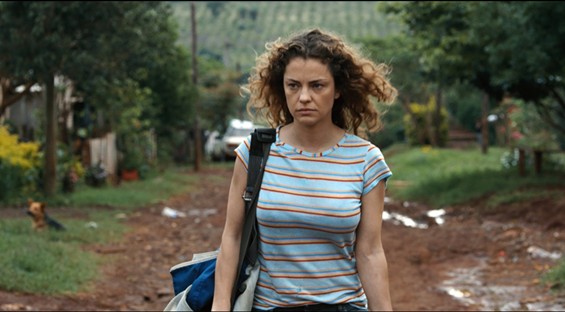
To read part one of Jemma’s coverage from Cannes 2015, click here.
My earlier observations on the discrepancy between the obvious depth and intelligence of the female talent involved in many of the films in the programme and in the market, versus the completely archaic expectations of female behaviour and appearance elsewhere was something that I struggled to shake this year. Last year in Cannes I watched some of my favourite female-centred films of the year (Girlhood, Timbuktu, Clouds of Sils Maria, A Girl Walks Home Alone at Night, Mommy, Two Days, One Night) and so in a year that Fermaux took on the task of wooing women with his programme of films and events, I was hopeful it might be a vintage year.
Unfortunately for me, in the many films I watched (which did not, unfortunately include the much-loved Mustang) I found the female characters and employment of female actors lacking. Like Fermaux’s message of gender equality, these characters were a little too mixed up, and for me, not in a good way.
Critics’ Week winner Paulina was a case in point. Following the titular character, a lawyer with a promising career, it charts her move to a humble neighbourhood where she begins teaching at a school for the neighbourhood kids. Altogether resistant to her act of charity, the students are blatantly unresponsive. In an act of flippant violence one night, she is brutally gang raped. In the face of the attack, Paulina remains stubborn: she will continue with her crusade and remain true to her ideals. Some people I spoke to admired Paulina’s resolute nature and the director Santiago Mitr’es (The Student) daring exploration of the effects of personal trauma on one’s intellectual ideals. However I was uncomfortable with the use of sexual violence to explore this, and couldn’t shake the feeling that Paulina’s character was left underdeveloped and therefore open to judgement. Paulina set in motion viewing a selection of films that took women as their subject and title.

Another prize winner Nahid that scooped a special mention in the Un Certain Regard category also left me frustrated in its obtuse depiction of its central character. A more thoroughly social realist take on the themes of Asghar Farhadi’s A Separation (which the lead in this film Sareh Bayet featured in), it follows a woman who is struggling to move on from her disastrous first marriage to find love and financial stability with a new man. Frustrated in her attempts to act autonomously, she finds herself in the impossible situation of choosing between living with her son and a man who makes her miserable, and moving on with a new man who is kind but comes with his own familial baggage. The film is well acted and it was refreshing to see a more gritty portrayal of the effects on working class women of the misogynistic marriage laws in Iran. A programming colleague I spoke to admired the lack of romanticism in the depiction of children in the film, especially in a national cinema that tends to romanticise the young. Ultimately though, I struggled to connect with Nahid, and her uneven portrayal left me with little clues as to her motivations.
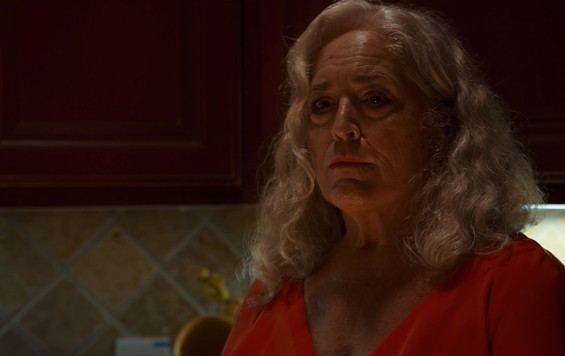
Another prize winner from SXSW, Krisha landed up in Critics’Week. Directed by 26-year-old Trey Edward Shults (who earned his stripes working on Malick’s The Tree of Life and who also acts in the film) the film centre’s on the return of an estranged member of the family (Shults own mother) to the family fold. It emerges that Krisha has been a terrible mother and sister, battling the demons of addiction and alienating her family. Shults has described how the film was shot in a few weeks in his mothers home and he cast family members in many of the main roles. All this adds a kind of rawness to the story, but there is something deeply uneasy about seeing the darker elements of Krisha’s personality emerge especially when we see her interaction with Trey. On first viewing, I admired the film’s stylistic choices and the mixture of fact and fiction, but I found the treatment of Krisha’s character unkind. However many critics whose opinions I admire cited this as one of their picks of the festival, so I am looking forward to revisiting this and discussing further.

Another theme that seemed to be emerging from my Cannes sidebar viewing was the under use of some great female actors. In The Anarchists, Adle Exarchopoulos (Blue is the Warmest Colour) plays Judith, a member of a small anarchist organisation at the turn of the Twentieth Century. Judith is a mouthy but ultimately passive spectator to most of the activity of the group and while her performance is admirable, her role didn’t allow her to display the range of talent we saw her exhibit in Blue is the Warmest Colour. It’s a well-made period drama with a great cast (including Tahar Rahim) but I think it’s UK prospects will be limited.

In Louis Garrel’s (son of Phillipe Garrel) directorial debut Two Friends, he casts Golshifteh Farahani (About Elly, The Patience Stone) as Mona, in another limiting role for an excellent actress. Garrel’s story (in which he also stars) centre’s on a love triangle that disrupts a particularly French and intense bromance. The film as a whole wasn’t entirely successful for me, but I was left utterly baffled by the character of Mona in particular, whose back story and screen presence never seemed to fit together.

I watched more French filmmaking royalty in the form of Arnaud Desplechin’s (Jimmy P., My Sex Life) My Golden Days which seemed to be universally adored by many critics who felt it was unfairly sidelined from the main competition.The film is French through and through, full of erudite historical references and nostalgia for first love. Its droll French humour was sometimes a little off for me (at one point the young hero’s charms as a womaniser are displayed to thrilling effect when a young woman’s skirt literally falls to the floor at the sight of him!) but the performance of newcomer Lou Roy-Lecollinet who plays Paul’s most intense love, Esther was a real treat. A troubled young woman whose understanding of the intense effect she has upon men has left her unable to meaningfully connect with other peoples emotions, Esther is a strangely detached character, but Roy-Lecollinet imbues her with a mighty and memorable cinematic presence that goes beyond the ingenue limitations of her role.
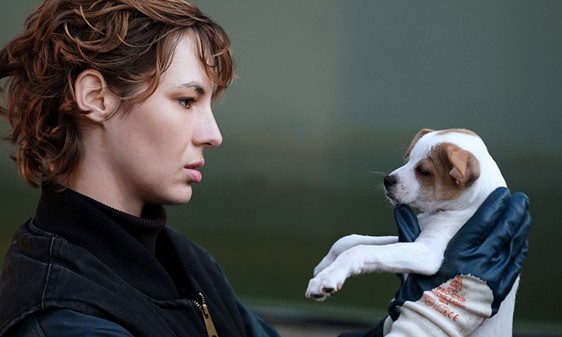
In I Am a Soldier, another French ingenue, Louise Bourgoin (The Extraordinary Adventures of Adle Blanc-Sec) is de-glammed and gives an admirably nuanced performance despite some unwieldy and variously over and under-written aspects of the script. The film which was debut feature by Laurent Larivire betrays perhaps too much admiration for the social realism of the Dardenne brothers, and the homage proves slightly too much weight to bear. Following the effects of economic austerity on 30-year-old Sandrine (Bourgoin) we see her return to her family home and struggle to find work. Unable to contribute to the shared family pot, she ends up getting sucked into her uncles dog-trafficking racket.While Bourgoin’s performance is great tonally, the story veers from social realism into thriller with a wrong turn into rom-com and these shifts end up obscuring any real insight into Sandrine’s plight.

The effects of economic hardship and the bonds of home were explored elsewhere too. In Camera D’Or winner Land and Shade, Cesar Acevedo’s austere Colombian debut explored the limited prospects for a family whose matriarch is stubbornly holding on to their ancestral land despite its harsh conditions and meagre work prospects. The films relentlessly monotonous pace is gruelling at times, but the film is spectacularly photographed and viscerally evokes the arid landscape in which it is set.
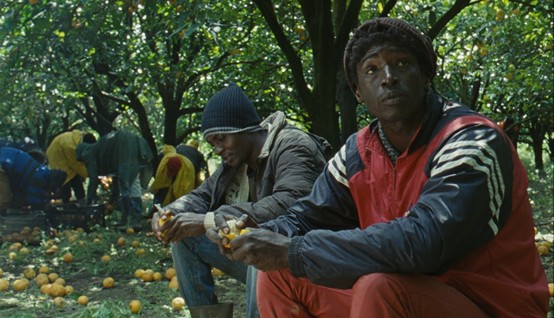
In Mediterrenea, possibly the most topical film in Cannes this year, first-time director Jonas Carpignano delivered a searing account of an African migrant who travels by boat from Burkina Faso to Italy. Carpignano was moved to explore this story after the 2010 race riots in Rosarno, Italy. When he travelled there to understand the fracture that had occurred in the community there, he met Burkinabe immigrant Koudous Seihoun whose story and magnetic presence he sensed would be perfect onscreen. This spirit of inquiry and collaboration is apparent in his film which mixes documentary-style storytelling with some well-directed dynamic sequences,especially in the journey to Italy and the riots in particular. The resulting film gives us no easy narrative answers to the protagonists plights, opting instead for an impressionistic portrait of a range of personalities who react to the challenges of their new home in different ways. While it’s a tricky proposition for many distributors, I hope this film is screened for UK audiences this year as its sure to provoke much debate.
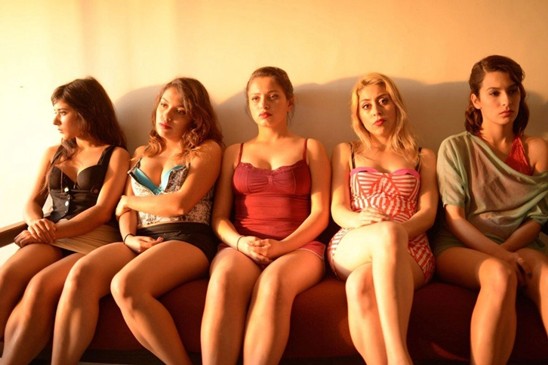
Another film that I am hoping will end it up on UK screens is The Chosen Ones (Las elegidas). Playing in the Un Certain Regard category, I was tipped off on its brilliance by a programmer friend from Morelia who knew the director David Pablos. A late night screening in the Debussy Theatre with its notoriously long and unruly queues is always a gamble, but this was one film I am really glad I didn’t miss. Taking on the bleak subject matter of sex trafficking in Mexico, I had been prepared by friends who had viewed before me that this was a seriously gruelling work. Beginning with a tender sexual encounter between two young lovers – 14-year-old Sofia (a stunning performance from Nancy Talamantes) and the slightly older Ulises (Oscar Torres) – the film reveals itself to be not a tale of young love, but a deeply disturbing exploration of the inner workings of a crime family. Ulises’ father and brother are both pimps and it turns out that Sofia is to be his first prey, to be isolated from her impoverished but loving family and groomed to work at his fathers brothel. Seemingly more sensitive than the other male members of his family, Ulises’ genuine affection for Sofia sees him make a Faustian pact for the release of his beloved. The film switches between Ulises’ and Sofia’s perspectives and I was struck by the artful way that Pablos navigated the tough subject matter, employing a brutal sound design and a split screen technique that never shows the violence endured by Sofia, instead deftly revealing the power balance of Mexico’s patriarchal society. The film is undoubtedly a challenging prospect for distributors, but the artistry on display here will attract the curiosity of more adventurous art house audiences. Special mention as a last word on this one must go to the cinematography by Carolina Costa, who counters the seedy world that is being explored through some striking visual symmetry and a saturated colour palate.

Sometimes in the midst of some of the weighty themes explored by the Cannes programme, a good rush of adrenaline is sorely needed and two films that did just that were Korean thriller Coin Locker Girl and American horror Green Room. Coin Locker Girl is a slick thriller that critic Leslie Felperin dubbed Mommie Dearest meets The Godfather. First-time director Han Jun-hee’s crime thriller casts veteran actress Kim Hye-soo as a female mob boss whose hitherto compliant protege (KimKo-eun), who she has raised since her childhood abandonment in a train station coin locker, begins to break free from her control. A bloody and satisfying watch with some great chemistry between its two leads made me forgiving of the few too many throat slashings and multiple endings that closed the film. Equally bloody, but inducing slightly less euphoria for me (but plenty of adrenaline) was Jeremy Saulnier’s follow up to Blue Ruin, Green Room. A grimy slasher-horror following an underground punk band that find themselves embroiled in a Texas Chainsaw Massacre-esque survival nightmare when they play a gig at a Neo-Nazi bar. One for the late night horror fans, it wooed many a critic in Cannes and is sure to be picked up by a distributor looking to get their genre kicks.
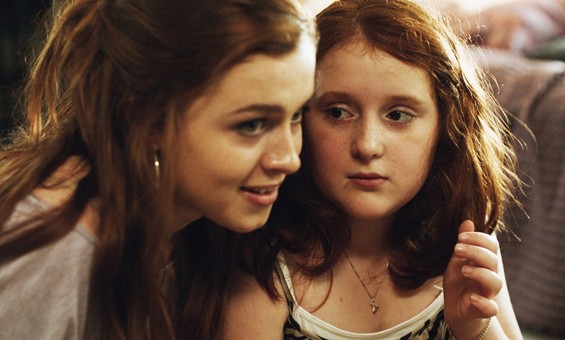
One of the biggest gambles at Cannes is making a foray into the Market. With enticing titles on offer this year like Sky Shark and Millionaire Dog, I needed to be careful not to get too distracted and end up not covering the actual Cannes selection. However, a couple of gems unearthed here deserve a mention, even though they are films that have premiered elsewhere. Berlinale 2015 Crystal Bear winner My Skinny Sister is the debut feature from Swedish director Sanna Lenken. The film explores the effects of a teenagers eating disorder on her younger sister who both idolises and resents her high achieving sister. I thought the subject matter was beautifully handled and the chubby and precocious younger sister is played with real compassion and authenticity by Rebecka Josephson, perfectly capturing the closed world that siblings can create outside of parental control.
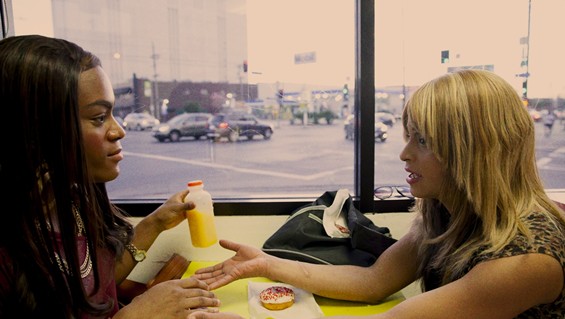
Sundance buzz title Tangerine, which was acquired during Cannes by UK distributor Metrodome, is the note I have to end on. It’s the very antithesis of Cannes filmmaking that is normally enshrined in the competitive sections, but the fact that this deal was closed in the market this year was music to my ears and smoothed over some of the more baffling awards choices announced. The fifth feature from Sean Baker (Starlet) it charts a Christmas Eve in the life of Sin-Dee and her best friend Alexandra: two trans ladeez of the all the damn day, who seem to be intent on setting the record for the most occurrences of the word bitch in a 90-minute film. After Sin-Dee accidentally finds out that her boyfriend has cheated on her with a fish (their term for biological females), she goes on a literal rampage to find her. As you can probably guess, its a foul-mouthed and explicit piece, but the two leads have a wonderful chemistry and the film ends on a poignantly beautiful note that underlines their deep friendship.The film has a suitably cool lo-fi feel, in part because it was shot in its entirety on iPhone 5’s. The films audience, like its budget will be modest but with Amazon series like Transparent and Orange is the New Black breaking into the mainstream, Tangerine is a joyous addition to the filmic explorations of transgender identity. If you only see one transgender-prostitute-film shot on an iPhone this year, make it Tangerine.

